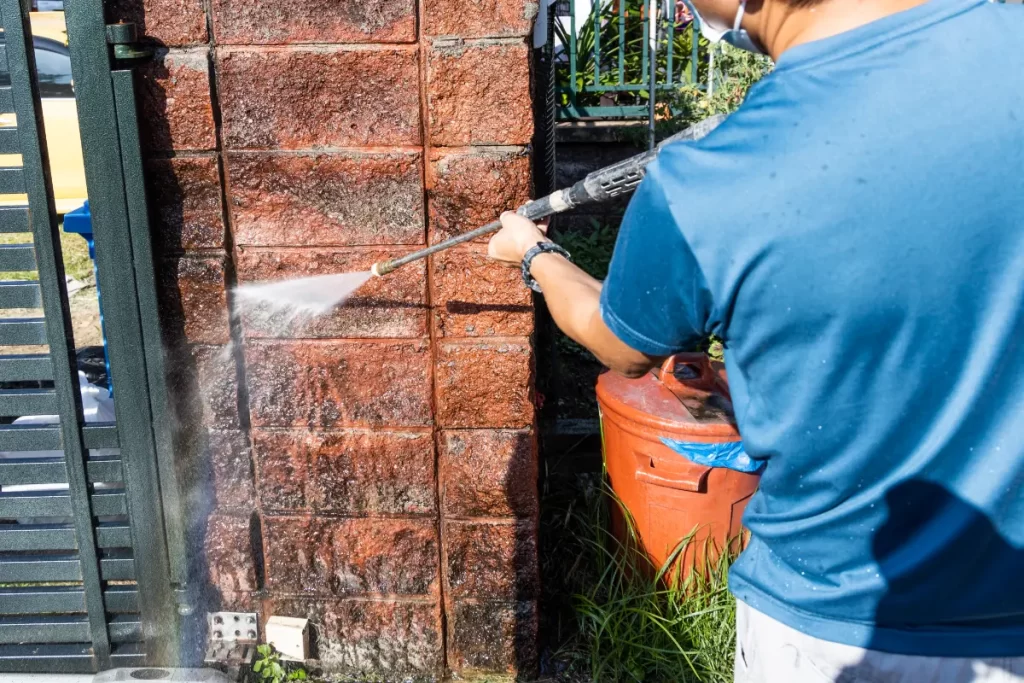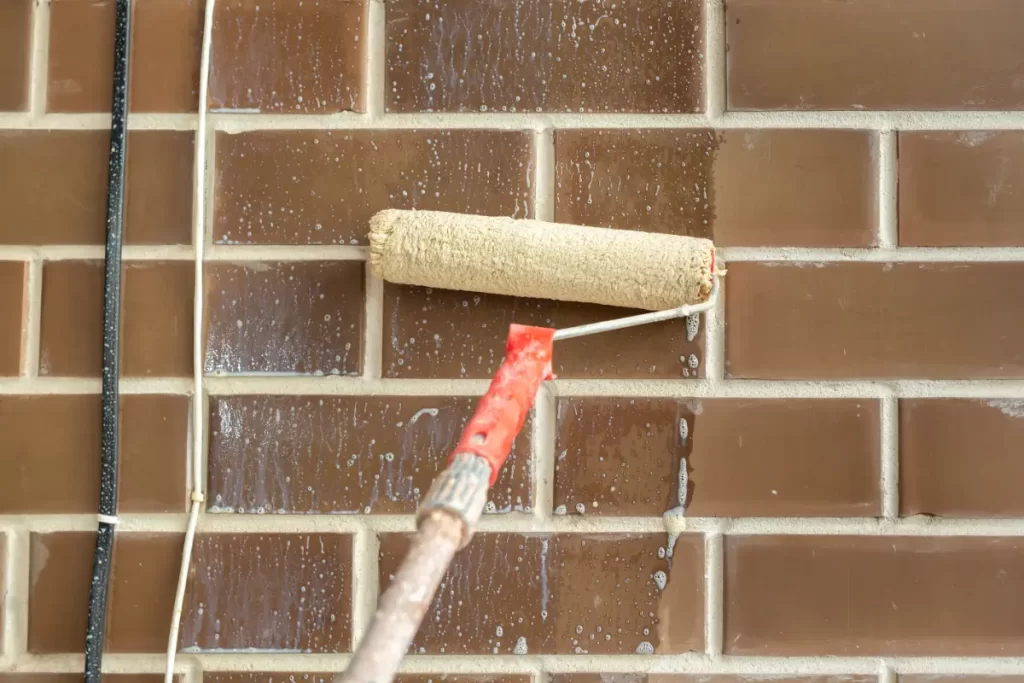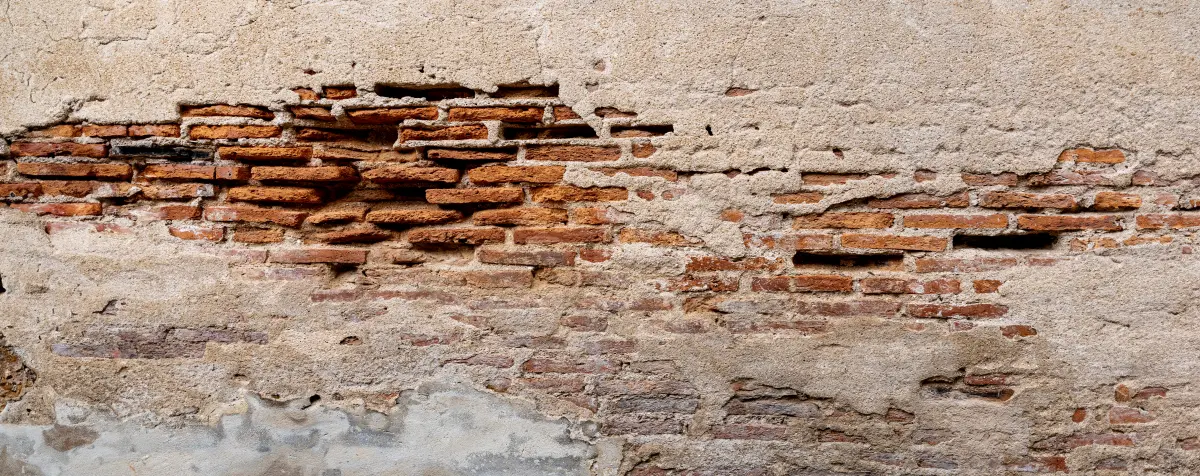Cleaning and restoring the brickwork around your home or on your property doesn’t just improve its aesthetic appeal but also maintains the structural integrity of the wall. Over time, brick can accumulate dirt, grime, stains, and even mildew, requiring homeowners to take action to preserve both the appearance and the quality of their brick surfaces.
Cleaning and preparing these surfaces properly can significantly enhance their longevity. This comprehensive guide will provide everything you need to know about effectively cleaning and maintaining both the exterior and interior brick walls.
Why does my brick wall need cleaning?

Understanding the accumulation of dirt and grime on brick surfaces
Unlike smoother finishes, the rough texture of brick and mortar makes it an ideal trap for a variety of pollutants – from dust and dirt to soot and biological growths like moss or algae. This accumulation not only diminishes the brick’s natural beauty but can exacerbate wear over time, underscoring the importance of brickwork cleaning.
The porous nature of clay brick, which is often used in building exterior walls, exacerbates this issue, as it absorbs moisture that can carry pollutants deeper into the brick’s surface.
Identifying signs that your brickwork needs cleaning
Recognizing when your brickwork requires attention is key to maintaining it properly. Signs include visible staining, discolouration, growth of vegetation or mildew, and accumulation of dirt and debris in the mortar joints. Such indicators suggest that it’s time to clean brick surfaces to prevent any potential damage.
The impact of neglecting brick cleaning on the structural integrity
If neglected, the build-up on brick surfaces can lead to a range of problems. Moisture trapped within the brick due to grime and debris can freeze during colder months, possibly causing the brick to crack or spill.
Additionally, harmful salts and chemicals deposited on bricks can corrode the material over time, further weakening the structure of the wall and threatening its integrity.
What are the best solutions for cleaning exterior brick walls?
Choosing the right cleaning solution for your brickwork
When facing the task of cleaning your brick, selecting the appropriate cleaning solution is vital. For general grime, a mix of water with a mild detergent may suffice, but more stubborn stains may require specialized cleaning agents.
It’s essential to consider the type of brick before applying any solution, as some cleaning chemicals can damage brick surfaces.
Home-made vs. commercial brick cleaning solutions: What works best?
For those debating whether to use homemade or commercial brick cleaning solutions, it largely depends on the condition of the brick and the type of stains present. A simple solution of warm water and vinegar in a spray bottle can be effective for light cleaning tasks, whereas commercial products might be necessary to tackle more stubborn stains.
Always test any cleaning solution on a small area of the brick to ensure it won’t cause damage.
How to properly mix and apply cleaning solutions on brick
To achieve the best results, mix cleaning solutions according to the manufacturer’s instructions and apply gently to the surface of the brick using a spray bottle or a soft bristle brush. It’s important to avoid saturating the brick, as excessive moisture can lead to damage.
After application, scrub the brick gently with a scrub brush before rinsing thoroughly with clean water to remove any residue.
How to tackle stubborn stains on brick and mortar?

Effective techniques for removing different types of stains from brick
Successfully removing stains from brick requires understanding the nature of the stain and choosing the correct cleaning method, which is a critical part of learning how to clean bricks for your next project.
Organic stains from moss or algae can often be treated with diluted bleach, while rust or paint may require specific chemical cleaning agents designed for brickwork cleaning. In all cases, gently scrubbing the area with a wire brush can help lift the stain from the brick’s surface without causing damage, a technique essential in brickwork cleaning.
Using the correct tools to clean without damaging the brickwork
Choosing the right tools is critical to avoid damaging your brickwork while cleaning. Soft bristle brushes or scrub brushes are generally safe for most brick surfaces, while wire brushes should be used cautiously, especially on older or softer brick types. Pressure washers can be effective for exterior brick walls but should be used at a low setting to prevent damage. We use a system ThermaTech machine which is superheated water at temperatures up to 150ᵒC, for the purpose of masonry cleaning, paint removal and coatings removal on heritage and other structures; more on this later.
Special considerations for cleaning mortar without harm
Cleaning mortar requires a gentle approach to prevent damage to the bricks and mortar joints. Mild detergents and soft brushes should be used, and care should be taken to rinse the area thoroughly afterwards to prevent leaving behind any residue that could attract more dirt.
For tougher stains in mortar joints, a narrow wire brush may be employed cautiously to dislodge debris.
Maintaining your interior brick: A different approach from exterior brick?
Key differences in cleaning interior vs. exterior brick walls
Interior brick walls generally require less aggressive cleaning methods compared to exterior walls due to less exposure to harsh environmental elements.
Dusting and vacuuming can remove loose dirt from interior surfaces, and mild detergent solutions can be used for deeper cleaning without the risk of introducing excessive moisture.
Preventative measures to keep your interior brick clean and pristine
To minimize the time and effort required in cleaning interior brick, regular dusting and prompt attention to spills or stains are essential.
Sealing interior brick with a silicone-based sealer can also provide a protective barrier against stains, making future cleaning easier and more effective.
Dealing with grime and mildew on interior bricks
In cases where grime or mildew has developed on interior brick surfaces, a solution of diluted bleach or a mildewcide product can be effective.
Always ensure proper ventilation when using chemical cleaners indoors and test any solution on a small, inconspicuous area before full application.
Step-by-step guide on how to clean a brick wall effectively
Preparation: Tools and solutions you’ll need for the job
Before starting the cleaning process, gather all the necessary tools and solutions for brickwork cleaning. You’ll need a bucket of warm water, mild detergent or a prepared brick cleaning solution, a spray bottle for application, soft bristle brushes or scrub brushes, and protection for your hands and eyes. Also, prepare a clean water source for rinsing.
Cleaning process: Scrubbing, rinsing, and dealing with tough spots
Begin by dampening the brick surface with clean water, which helps prevent the brick from absorbing the cleaning solution too rapidly. Apply your chosen solution using a spray bottle or a soft brush, then gently scrub the surface to lift dirt and stains.
For tough spots, additional applications or a more targeted approach with a wire brush may be necessary. Rinse the area thoroughly with clean water, ensuring all soap residues are removed.
Aftercare: How to maintain clean brickwork and avoid frequent cleanings
After cleaning, taking steps to prevent rapid re-soiling can extend the time between cleanings. Apply a sealant specifically designed for brick to protect against moisture and stains.
Regularly inspecting your brickwork for damage and addressing issues promptly can also prevent problems that could lead to more significant cleaning challenges in the future.
DIY vs. Professional Exterior Brick Cleaning: Making the Right Choice
Choosing between DIY and professional exterior brick cleaning involves more than just the initial cost; it’s about ensuring the longevity and beauty of your property. Professional services Brick cleaning in London like Environ Property Services offer not only expertise and experience but also access to advanced cleaning technologies such as the ThermaTech system. This method uses superheated water to effectively remove stubborn stains and biological growths without damaging the brickwork, a level of care and efficiency that DIY methods struggle to match. Moreover, the safety, environmental considerations, and long-term cost savings provided by professionals underscore the value they bring to maintaining your property’s aesthetic and structural integrity.
Opting for a professional cleaning service ensures that your brickwork is treated with the precision and care it deserves. With the right tools and expertise, professionals can significantly extend the life of your brickwork while preserving its natural beauty. Environ Property Services specializes in such meticulous cleaning processes, making them a wise choice for homeowners seeking to protect and enhance their investment. Visit our website to discover how professional brick cleaning can make a difference for your home or property.
Frequently Asked Questions:
Q: What do I need to know about cleaning and restoring my home’s exterior brick walls?
A: Cleaning and restoring your home’s exterior brick walls involves removing dirt and grime without causing damage to the brick. It’s a delicate process that often requires specific brickwork cleaning solutions. It’s essential to choose the right ways to clean that will not harm the brick face. Gentle methods include using water to clean the brick or specific brick cleaner solutions designed for this purpose. Avoid abrasive cleaning methods that can erode or damage the brickwork.
Q: Can I use a pressure wash to clean brick walls without causing damage?
A: While using a pressure wash can be an effective way to clean the brick, it’s crucial to use it correctly to avoid damage. The high pressure can cause harm to older or more fragile bricks. It’s best to use a low-pressure setting and keep a considerable distance from the brick surface when spraying, to protect the individual bricks. Test a small, inconspicuous area first to ensure it won’t damage the brick.
Q: Are there specific cleaning solutions recommended for brick exteriors?
A: Yes, there are specific brick cleaning solutions available that are formulated to safely clean the surface without causing damage, ideal for those planning to apply brick sealant afterward. These cleaners help to remove dirt and grime effectively while protecting the brickwork. It’s also possible to make a mild cleaning solution at home using water and a small amount of detergent. Avoid using acidic cleaning solvents, as they can erode the face of the brick over time.
Q: How can I clean bricks that are particularly old or delicate?
A: For cleaning old or delicate bricks, such as old brick or engineering bricks, it’s vital to use a gentle approach. Start with the softest cleaning method possible, such as brushing with a soft-bristled brush to clean the surface or using water to spray the brick gently. If necessary, move on to a mild brick cleaner, but always test a small area first. Avoid high-pressure washing and harsh chemicals that can damage the brick face.
Q: What’s the best way to deep clean interior and exterior brick walls?
A: To deep clean interior and exterior brick walls, start by dusting or vacuuming the surface to remove loose dirt. For a deeper clean, use a mixture of water and gentle detergent, applying it with a soft brush to scrub the bricks gently. For exterior bricks, a garden hose with a gentle spray setting can be used to rinse off the solution. In the case of stubborn stains, a specialized brick cleaner may be necessary. Always rinse thoroughly with water after cleaning.
Q: How can I protect my brickwork after cleaning?
A: To protect your brickwork after cleaning, consider applying a sealant designed for brick exteriors. Applying brick sealant can help to repel water and prevent dirt and grime from adhering to the surface, making future cleaning easier. Ensure the brick is completely dry before applying any sealant, and choose a breathable product that won’t trap moisture within the brick, which could lead to damage over time.
Q: Are there any unconventional methods to keep your bricks clean and maintain their look over time?
A: Beyond conventional cleaning methods, maintaining the cleanliness of your bricks involves regular, gentle cleaning to prevent the buildup of dirt and grime. Some homeowners use diluted vinegar solutions for spot cleaning, though this should be done with caution to avoid damaging the brick. Additionally, strategically placed landscaping can help shield brick walls from excessive dirt and splashes, reducing the need for frequent cleaning.
Q: Can I clean brick exteriors with everyday household items?
A: Yes, everyday household items like diluted dish soap or vinegar can be used cautiously to clean brick exteriors. When using such items, it’s essential to thoroughly rinse the area with water afterward to prevent any potential damage to the brickwork. For tough stains, creating a paste with baking soda and water, applied with a soft brush, can be effective. Always test these methods on a small, inconspicuous area first.

